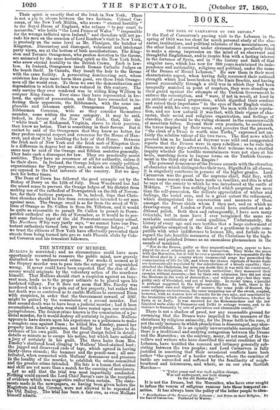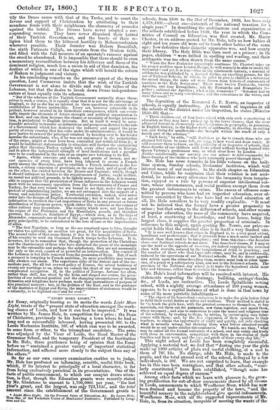BOOKS.
THE EARL OF CARNAHVON ON THE DRTIBER.* Iv the Earl of Carnarvon's passing visit to the Lebanon in the spring of 1853 was too short for much personal study of the cha- racter, institutions, and political relations of the mountaineers, on the other hand it occurred under circumstances peculiarly fitted to make a strong impression on the -mind of an observant and thoughtful Englishman, and to inspire him with a lasting interest in the fortunes of Syria, and in " the history and faith of that singular race, which has now for 800 years maintained its inde- pendence and nationality, religions and political, under the name of the Druses of Mount Lebanon." He saw them in their most characteristic aspect, when having fully recovered their national strength which had been broken by the Emir Besehir' and having pas successfully through a civil war in whioh they had been unequally matched in point of numbers' they were standing on their guard against the attempts of the Turkish Government to enforce the conscription, and were, if not in revolt, at least in an attitude of armed preparation which dignified their conduct and raised their importance" in the eyes of their English visitor. He could with his own eyes compare the men with their reputa- tion and see how natural it was that, with their vigour of cha-
racter, their social and religious organization, and feelings of danship, they should be the ruling element lathe commonwealth of mountain tribes. Beyond their own precincts, he could mark the terror inspired by their name, and perceive that the proverb, "the cloak of a Druse is worth nine Turks," expressed not un- fairly the relative valour of the two races. The first news which greeted him as he landed at Beyrout were wild and exaggerated reports that the Druses were in open rebellion ; as he rode into Damascus many days afterwards, his first welcome was a startled inquiry whether the terrible mountaineers were not close at his heels, marching down to impose terms on the Turkish Govern- meist in the third city of the Empire ? The personal demeanour of the Druses accords with the elevation of character which distinguishes their race. Dignified in all classes, it is singularly courteous in persons of the higher grades. Lord Carnarvon was the guest of the supreme chief, Said Bey, with whose name recent events have made us familiar, and this is what he says of the society to which he was introduced at the castle of Matara. "There was nothing indeed which surprised me more than the self-possession, the delicate appreciation of wishes and feelings, the social ease, and to a great extent the refinement, which distinguished the conversation and manners of those amongst the Druse chiefs whom I then met, and on which no drawing-room of London or Paris could have conferred an ad- ditional polish. Both then and, subsequently, I have seen many Orientals, but in none have I ever recognized the same re- markable combination of social qualities.' Unfortunately, the history of every age and race testifies that a large endowment of the qualities comprised in the idea of a gentleman is quite com- patible with utter indifference to human life, and. forbids us to regard the late horrible massacrei of the Christians by the high- minded and polished Druses as an anomalous phenomenon in the annals of mankind.
"Nor do the Druses, guilty as they unquestionably are, appear to have played the mast criminal part in the transaction. They broke the peace with the Maronites, but it will be ever a question who was responsible for the first blood shed in a country where immemorial usage has prescribed the compensation of life for life, and where the chance reprisals of border feuds are systematically regulated by the calculations of a bloody equality; they attacked the Christians, but none can doubt that it was with the connivance, if not at the instigation, of the Turkish authorities; they massacred their enemies without measure,—but by their own admission they did not rival the Moslems in the work of destruction ; and without pity—but they were guilty only of bloodshed, and not of brutality. In recent times, a-parallel is perhaps suggested in the high-caste Hindoo. In both, there is the same natural ease and dignity of manner, the same Pride of descent, the same religious exclusiveness, the same unsparing use of the sword, coupled, however, with no wanton love of cruelty for its own sake, and unpolluted by the brutalities which attended the massacres of the Christians, whether in Syria or in India. • It was reserved for the Mahommedanis and the low fanatical mobs alike of Damascus and Delhi to outrage women, and to do violence to humanity by acts of gratuitous and abominable cruelty."
There is not a shadow of proof, nor any reasonable ground. for surmising that the Druses were impelled to the massacre of the christians by religieus animosity, for the Druse faith is the rare, if not the only instance in which proselytism is discouraged, nay abso- lutelyprohibited. It is an equally unwarrantable assumption that
i
there s a traditional and undying antagonism between the Druses and the Maronites ; on the contrary, many, if not most of the tra- vellees and writers who have described the social condition of the Lebanon, have testified the concord, and intimacy generally sub- sisting between the two peoples ; and Lord Carrtarvon is fully justified in asserting that their occasional conflicts have been rather "the quarrels of a border warfare, where the enmities of battle are succeeded and softened by the familiarity of neigh- bourhood and intercourse, and, where, as on, our own Scottish Marches- ' " 'Twixt peace and war such sudden change,
Was not unfrequent, nor held strange In the old Border day."
It is not the Druses, but the Marmites, who have ever sought to infuse the venom of religious rancour into these temporal en- mities. It has always been the policy of the latter people to idea- • iteconectiona of the Druses of the jebonon ; and Notes or, their Religion, By the Earl of estruarron. Published by Murray.
tify the Druse cause with that of the Turks, and to court the favour and support of Christendom by attributing to their mundane feuds with their neighbours the character of crusades against the infidel. The Druses have never adopted a cor- responding course. They have never disguised their hatred of their Turkish Government, and the tenets of their re- ligion bind them to the bitterest hostility to Mohammedanism
wherever possible. Their founder was Hakem Bemrillah, the sixth Fatimate Caliph, an apostate from the Moslem faith, and filled with the full measure of an apostate's rancour against the creed he abandoned. It is impossible that there should be even a momentary reconciliation between his followers and those of the dominant religion, much less a union in aid of that dominion, the decline of which is one of the signs which will herald the return of Hakem to judgment and victory. In his concluding remarks on the present aspect of the Syrian question, Lord Carnarvon insists that the wish of the Turkish Government is not alone to divide and rule the tribes of the Lebanon' but that the desire to break down Druse independence enters at least equally into its schemes.
"But if the schemes of the Turkish Government naturally shape them- selves to such a course,-it is equally clear that it is not for the advantage of England, so far as she has an interest in these questions, to consent to the annihilation of Druse nationality. Every act, however colourable in its pretext, however neutral in its immediate consequences, which can event- ually impair the elements of future strength and political organization in the East, and can thus increase the chance or necessity of foreign interven- tion, is prejudicial to English interests. But in itself it would be ques- tionable morality to transfer an industrious and prosperous district to the rule of a Government which has destroyed the industry and sapped the pros- perity of every country that has come under its administration; it would be poor justice to reward the principal criminal by handing over to his tender mercies the subordinate, who, if he was not encouraged to the perpetration of the crime, might at least have been controlled and withheld from it ; it would be indifferent statesmanship to stimulate still further the centralizing policy that threatens Turkey equally with every other nation in Europe, and to allow the independent strength of local institutions and a pieenhar race to be confounded in the ruin of an empire now tottering to its fall.
"Again, whilst convents and schools, and grants of money, and se- cret agencies of every kind, have long laboured to create a French party among the Maronites, and to establish a French influence in the Le- banon, a strong connexion of gratitude on the one hand, and of good offices on the other, has existed between the Druses and England ; which, though it should interpose no harrier to the requirements of justice, ought neither, On moral nor political grounds, to be lightly severed. If, then, it is reason- able to suppose that the prostration of Druse influence in the Lebanon would meet with no unnecessary opposition from the Governments of France and Turkey, for that very reason we are bound to see that, under the specious pretext of administering justice, we are not entrapped into the support of a wrong and mischievous policy. Territorial extension, indeed, need never enter into the dreams of English statesmanship ; but it would be an act of infatuation to overlook the vast importance of Syria in any present or future distribution of European power, which either the weakness or the crimes of other nations may necessitate. The country which now, not less than in the reigns of the Ptolemies and the Mamelukes, guards, and therefore governs, the northern frontiers of Egypt,—which now, as in the days of Mexander, commands one at least of the great approaches to India,—is no petty principality, to be surrendered to the love of ease or the importunities of -silica.
"The first Napoleon, so long as the sea remained open to him, thought no vision too splendid, no sacrifice too great, for tie acquisition of Syria. The second ruler of that name thinks it due to the honour or the interests of his country to send six thousand French troops to the Lebanon. It is, however, for us to remember that, though the protection of the Christiana and the chastisement of those whe have disturbed the peace of the mountain may be the ostensible and perhaps the satisfactory, they are not necessarily the only or the real, causes of so powerful an intervention. The control of the Lebanon is but little removed from the possession of Syria. But, if such a prospect is tempting to French ambition, its mere possibility may reason- ably awaken our alarm. The experience alike of the distant and of the im- mediate past, the all but avowed policy of France, the actual tendency of events are warnings to us, when we consult the chart of our dangerous and complicated navigation. If, in the politics of Europe, fortune too often, rather than skill, has stood by the helm and shaped our course, the pecu- liarities of our national position and the ehanging circumstances of foreign dynasties and kingdoms have perhaps made that unsteadiness of purpose of less 'medical moment ; but, in the politics of the East, and in the guidance of the destinies of Egypt and Syria, the improvidence of statesmen would be a calamity, to be deplored once and for ever."



























 Previous page
Previous page